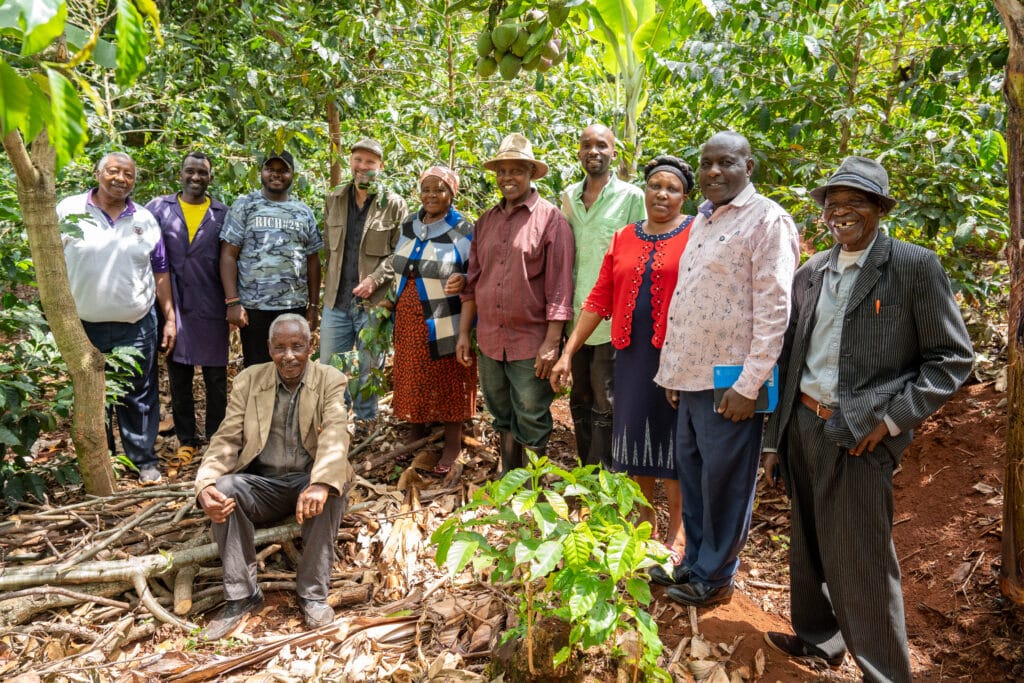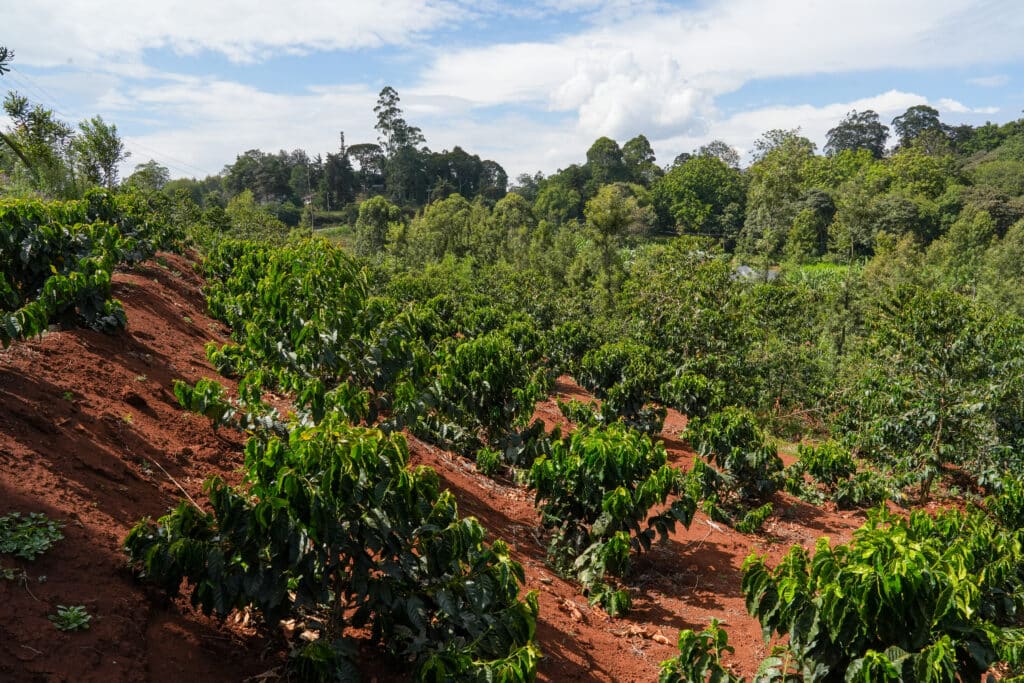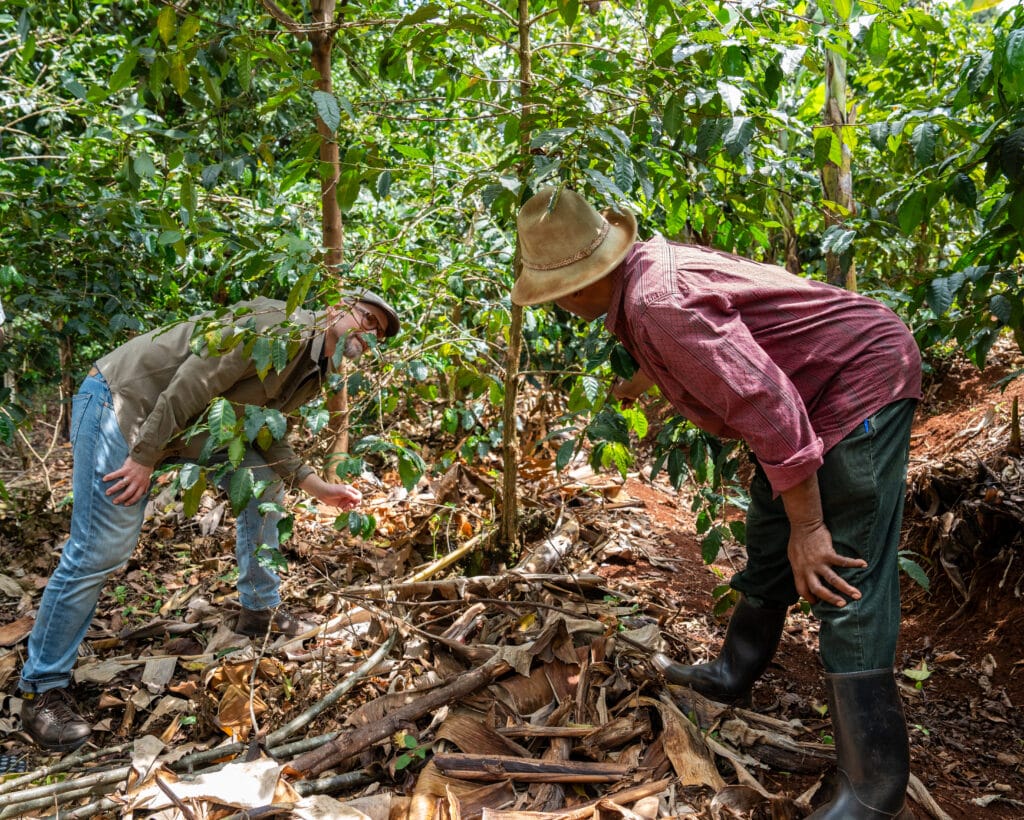Agroforestry in Kenya is on the rise. Kenya, renowned for its high-quality Arabica coffee, faces challenges from traditional monoculture practices leading to soil degradation and reduced biodiversity. To combat these issues, GrowGrounds has partnered with three prominent coffee cooperatives based in Kenya in Nyeri County: Iriani Farmers’ Cooperative Society, Kiawamuru FCS, and Aguthi Farmers’ Cooperative Society. This collaboration aims to transform 3,500 hectares of coffee plantations into nature-growing, carbon-sequestering agroforestry systems, engaging 5,800 farmers and planting 1.1 million trees.

Agroforestry in Kenya
Agroforestry integrates trees and diverse crops within agricultural landscapes, fostering robust and sustainable ecosystems. In Kenya, this approach has proven beneficial for both the environment and coffee farmers. By adopting syntropic farming methods, which emulate natural forest succession, farmers enhance soil fertility and increase yields. This practice not only boosts coffee production, but also diversifies income through additional crops, reducing reliance on chemical inputs.
Why Syntropic Farming in Kenya is a Game-Changer for Coffee Production
GrowGrounds’ nature-growing system uses syntropic farming and agroforestry in Kenya. A method that enhances soil fertility without the use of synthetic fertilizers, making it an ideal solution for Kenyan coffee farmers facing soil degradation. The inclusion of fast-growing pioneer species, organic mulch, and dynamic pruning strategies accelerates the regeneration of soil nutrients. With these methods, Kenyan farmers can cultivate high-quality coffee while reversing land degradation.
How Nature-Growing Boosts Climate Resilience in Kenya
Nature-growing systems such as agroforestry and syntropic farming play a critical role in Kenya’s response to climate change. By planting trees and diversifying crops, farmers are creating microclimates that protect coffee plants from extreme weather conditions. The ability of agroforestry systems to sequester carbon further positions Kenya’s coffee industry as a leader in climate-positive farming. Through initiatives like GrowGrounds’ partnerships with local cooperatives, agroforestry is being scaled as a model for long-term sustainability in coffee production.

Sustainable Coffee Production in Kenya
Sustainable coffee production in Kenya is about more than just growing high-quality beans—it’s about creating a system where economic viability and environmental stewardship go hand in hand. Farmers adopting nature-growing practices reduce their dependence on synthetic fertilizers and pesticides while improving their farm’s ecological footprint. The integration of cover crops, composting, and agroforestry techniques ensures that coffee farming remains productive for future generations.
Certifications and Market Access for Kenyan Coffee Farmers
One of the key drivers of sustainable coffee production is access to premium markets. Certifications like Fairtrade, Rainforest Alliance, and organic coffee labels help Kenyan coffee farmers secure better prices while ensuring adherence to environmental and social sustainability standards. With increasing global demand for ethically sourced coffee, Kenya’s transition to sustainable coffee production strengthens its competitive position in the specialty coffee market.
Forest Coffee Farming: From Monoculture to Agroforestry in Kenya
Forest farming in Kenya is redefining how coffee is cultivated. Instead of clearing land for coffee plantations, farmers are integrating coffee plants into existing forests or reforesting degraded land. This method protects biodiversity and supports ecosystems while maintaining coffee production. Shade-grown coffee not only enhances flavor complexity but also provides habitat for birds, insects, and other wildlife crucial to maintaining ecosystem balance.
Forest coffee in Kenya will be the key driver in saving coffee production in the region.
The Environmental and Economic Benefits of Coffee Forests
Forest farming contributes to soil regeneration, prevents water runoff, and enhances carbon sequestration. Additionally, the diversification of tree species within coffee farms allows farmers to generate income from timber, fruits, and medicinal plants. By promoting forest farming, Kenya is ensuring the longevity of its coffee industry while simultaneously protecting its rich natural heritage.

Economic Empowerment of Kenyan Farmers Through Agroforestry
How Agroforestry Strengthens Farmer Livelihoods
For many smallholder farmers in Kenya, traditional coffee farming has been a financially precarious endeavor. By integrating agroforestry systems, farmers diversify their income streams, reducing dependence on fluctuating coffee prices. Trees planted within coffee farms provide additional revenue through fruit, timber, and carbon credits, making farming more resilient to economic and environmental challenges.
Financial Incentives and Carbon Credit Markets
Kenyan farmers adopting agroforestry practices are gaining access to international carbon credit markets, where they can sell verified carbon offsets to companies aiming to reduce their environmental impact. GrowGrounds’ partnership with local cooperatives ensures that farmers receive technical training and market connections, enabling them to capitalize on this emerging revenue stream. By monetizing sustainable practices, agroforestry not only improves the environment but also lifts farmers out of financial vulnerability.
Sustainable Farming Methods in East Africa: A Regional Perspective
Across East Africa, sustainable farming methods are being adopted to combat soil erosion, desertification, and food insecurity. Techniques such as agroforestry, permaculture, and water conservation farming are proving effective in enhancing crop yields while protecting natural resources. These methods are particularly vital in ensuring that agriculture remains viable despite the challenges posed by climate change.
Scaling Sustainable Agriculture Across the Region
The success of sustainable farming in Kenya is inspiring neighboring countries to adopt similar practices. Programs promoting regenerative agriculture in Uganda, Tanzania, and Ethiopia are strengthening regional food systems and enhancing climate resilience. By fostering knowledge-sharing and investment in sustainable farming technologies, East Africa is positioning itself as a leader in eco-friendly agricultural innovation.
Economic Empowerment through coffee production in Kenya
Participating farmers from Kenya receive training and technical support to implement agroforestry practices. They also gain direct access to global carbon markets via certified carbon credits under the Gold Standard, providing a new revenue stream and promoting economic empowerment. The initiative contributes significantly to CO₂ sequestration, ecosystem restoration, and aligns with Kenya’s national goals for sustainable land use and climate action.
GrowGrounds connects farmers and businesses around the world to help in this transition: Benefitting the farmer, the business and the planet.
GrowGrounds’ Commitment to Sustainability
As a leader in agroforestry and carbon markets, GrowGrounds is dedicated to supporting farmers through education, technical expertise, and facilitating carbon credit sales. Our mission is to drive business growth by growing nature, creating solutions that benefit both people and the planet. This partnership in Kenya marks the beginning of our efforts, with plans to expand to 30,000 hectares across East Africa by 2029, positively impacting more farmers and ecosystems in the region.
Contact us now if you would like to collaborate either as a business, farmer or organisation.


